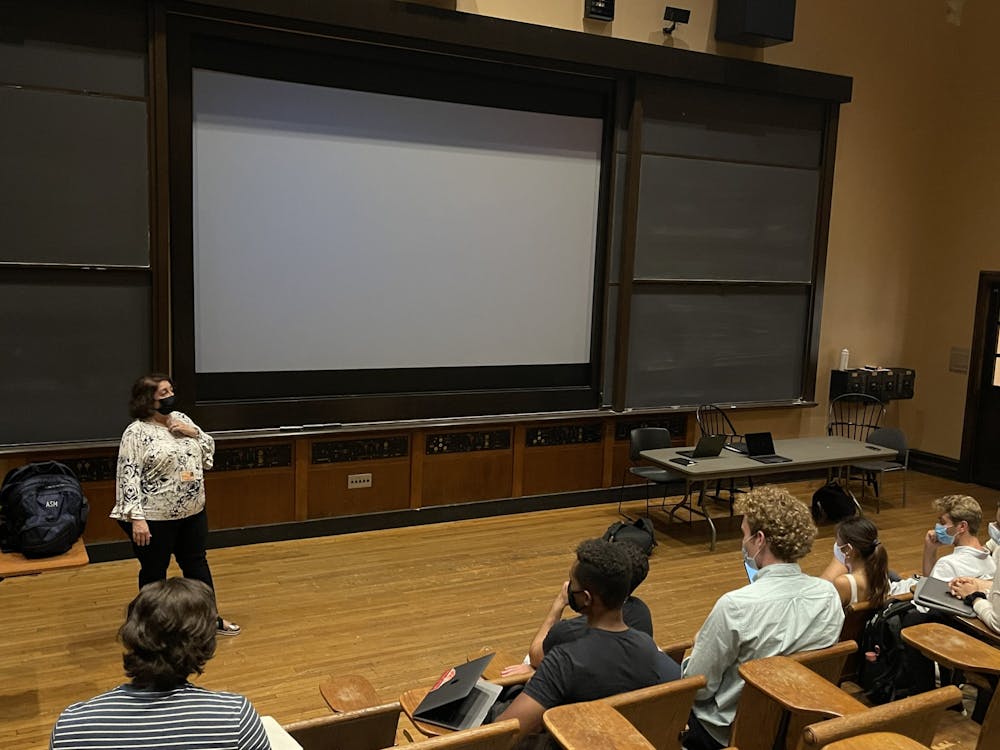At this week’s Undergraduate Student Government (USG) meeting, Assistant Vice President for Environmental Health and Safety Robin Izzo presented on the University’s recent responses to the COVID-19 pandemic.
She outlined the parameters that an advisory committee uses to determine the risk level on the University COVID-19 dashboard. She also shared her plans and hopes for the future of University public health policies.
“We have planned for anywhere up to a 0.5 percent [positivity rate],” she said. “Anything above that is considered a high-risk situation.”
The campus COVID-19 dashboard defines campus positivity rate as “a Princeton-specific metric” that “represents one of multiple factors that helps to determine the Campus Risk Level.” The dashboard says that “University public health professionals monitor case rates daily and use [specific ranges] to assign a weekly positivity rate to the campus population.”
As of Sept. 20, the campus positivity rate was 0.08 percent, placing it within the ‘Low to Moderate’ risk category.
The testing facility is able to detect group transmission by comparing positive cases to each other via rapid PCR, which also determines the strain of the positive case.
“They are all Delta [variants],” Izzo said about the positive cases identified this semester.
Izzo also emphasized that mitigation decisions are made based on positive test rates and knowledge related to social and group dynamics. If trends are spotted, mitigation efforts are implemented in those specific places.

She brought up the example of the spring 2021 semester, in which there was a cohort of positive cases among student athletes.
“[Only student athletes] had to undergo testing three times a week,” she said.
The current vaccination rate for undergraduate students on campus is 98 percent.
“Not everyone on our campus is vaccinated, and some of those that are vaccinated are immunocompromised and do not feel comfortable in certain situations,” she said.

She also brought up the current in-class masking policy for small classrooms. For seminars or small classes with fewer than 12 students, instructors may decide whether to require masks, as long as they are vaccinated.
“Not every student is going to feel comfortable saying ‘I am okay with [not wearing a mask],’” Izzo pointed out.
Izzo noted that the University is “paying close attention to the schools that are having surges” and this is one reason why there is a universal masking policy in place, since some of those schools did not have a universal masking policy instituted prior to their surge.
USG President Christian Potter ’22 pointed out that many students are coming down with illnesses that are not COVID-19 but are causing many to miss class or even attend class ill.
“If you are feeling any COVID symptoms but are unsure if you have COVID or not, do not go to class,” Izzo clarified.
Izzo also pointed out that students can submit tests any day regardless of their assigned day, even just to verify that they do not have COVID-19. If a student has COVID-19 symptoms, however, they should not submit a test in the asymptomatic testing program and should contact University Health Services to arrange a test at McCosh Health Center.
She concluded by promoting the annual FluFest, where flu vaccines will be distributed to the University community for free. Details about the upcoming FluFest have not been released yet.
Beyond Izzo’s presentation, the Senate also unanimously approved the appointment of six new U-Councilors, which were selected by the Executive Committee from application review. Mohamed Jishi ’24, Alen Palic ’23, Isabella Shutt ’24, Anna Sivaraj ’23, Eric Sklanka ’23, and Jiwon Yun ’22 were confirmed.
At the end of the public meeting, the Senate moved into a private Executive session to select the U-Council representatives to the Council of the Princeton University Community (CPUC) and the U-Council Chair.
Riley Martinez ’23 and Stephen Daniels ’24 were elected by the Senate to serve on the CPUC, and Martinez was also elected U-Council Chair.
USG Senate meetings are open to all undergraduate students and take place every Sunday night at 8 p.m. in Frist Campus Center, room 302.
Andrew Somerville is a staff writer who corresponds with and covers USG happenings and other campus news. He can be reached at jas19@princeton.edu.
Editor’s Note: This article has been updated to clarify some of Izzo’s statements.








